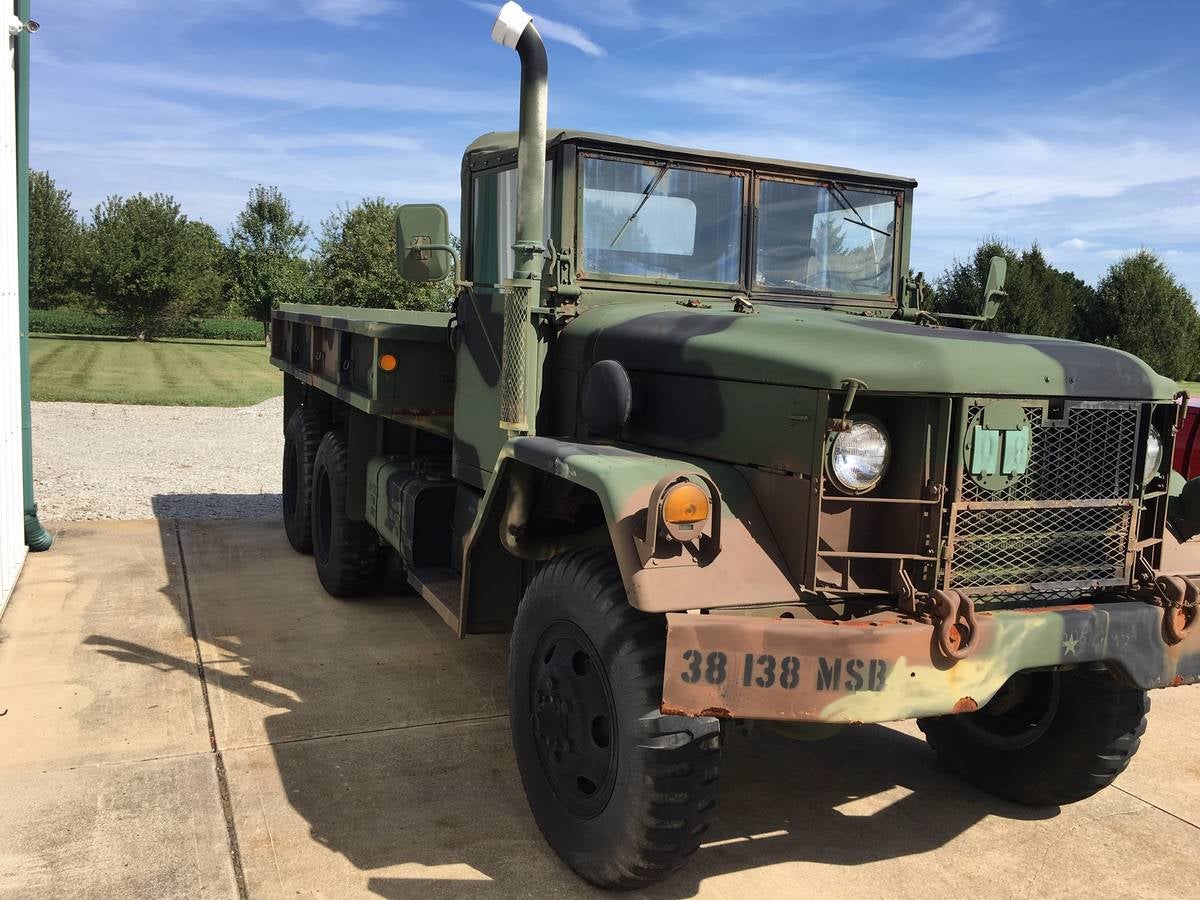 "Just Jeepin'" (macintux)
"Just Jeepin'" (macintux)
09/03/2019 at 14:40 ē Filed to: Jeep, m35a2
 1
1
 9
9
 "Just Jeepin'" (macintux)
"Just Jeepin'" (macintux)
09/03/2019 at 14:40 ē Filed to: Jeep, m35a2 |  1 1
|  9 9 |

This ad caught my eye, and if I could (and could afford a power steering conversion) Iíd grab it. Right down the street from me.
What struck me as curious, though, was the engine hours total. Iíve never heard why thatís considered such a big deal for diesels, and also this one struck me as odd.
Essentially, it comes out to 28mph for the entire lifetime of the truck. Iím quite surprised it didnít spend more time idling.
Anyway, so I donít have to bother searching online and so I have a reason to post this beauty: whatís the deal on diesels and runtime?
!!! UNKNOWN CONTENT TYPE !!!
 OPPOsaurus WRX
> Just Jeepin'
OPPOsaurus WRX
> Just Jeepin'
09/03/2019 at 14:45 |
|
runs grate....

must have some sort of power takeoff connection
 MultiplaOrgasms
> Just Jeepin'
MultiplaOrgasms
> Just Jeepin'
09/03/2019 at 14:56 |
|
I am no expert on the subject, but Passenger cars and OTR Trucks usually spend most of their time moving at a reasonable speed so engine hours do not matter as a general indicator of engine wear . They usually donít have a tachometer measuring operating hours either . Other types of self propelled utility vehicles †such as construction equipment, tractors †do not cover large distances over a day of operation , but instead on standby, constantly idling to be immediately ready for work when needed as constantly starting and shutting off increases wear on the starter motors. Military vehicles fall into a similar category since they typically do not spend a lot of time on a Motorway either.
Engine hours are therefore an indicator of engine wear in applications where the distances covered are usually miniscule.
 MKULTRA1982(ConCrustyBrick)
> Just Jeepin'
MKULTRA1982(ConCrustyBrick)
> Just Jeepin'
09/03/2019 at 14:59 |
|
Does anyone know if engine hours takes into account RPM? Would engine hours on a car used for city driving vs one used for highway miles assuming they had travelled the same cumulative distance?†
 benn454
> Just Jeepin'
benn454
> Just Jeepin'
09/03/2019 at 15:05 |
|
†Commercial diesels usually spend most of their lives idling, and many times aren't shut off until the job is done, which can take days. They're designed to be run constantly like this, but they still experience wear. A high hour engine is still going to be worn out even if the mileage is low.
 jimz
> Just Jeepin'
jimz
> Just Jeepin'
09/03/2019 at 15:06 |
|
low speed or off-road vehicles where miles traveled may not be easily measurable, or very low for the amount of time the engine is working. †or just plain donít have an odometer. Especially in applications where the engine may be operating while stationary (fire trucks, cement mixers, etc.) Plus, medium and heavy-duty engine manufacturers like Cummins often specify the mean time before overhaul (MTBO) in hours since the engines they sell can be used in many applications. some mobile, some stationary.
 vondon302
> Just Jeepin'
vondon302
> Just Jeepin'
09/03/2019 at 15:08 |
|
I donít know but my p71 vic had 6034 hours when I sold it and the hours only counted in park.
 jimz
> MultiplaOrgasms
jimz
> MultiplaOrgasms
09/03/2019 at 15:14 |
|
most of that, yeah. the other difference is that with light vehicles, the engine manufacturer is almost always the vehicle manufacturer. Until recently, with medium and heavy trucks and vocational vehicles, that was rarely the case. Historically, in the US Mack and GM were the two who made their own heavy duty engines, International made some medium duty ones, and everyone else just bought engines from Cummins, Caterpillar, and Detroit Diesel. So with a light duty vehicle, the manufacturer has control over the design of the entire vehicle and can design it as a system where overall mileage is a decent indicator of lifespan and is easy for the typical owner to keep track of and understand.
edited to add: the heavy truck market has changed significantly over the past decade. Cummins is pretty much the only company whose primary business is selling engines to vehicle manufacturers . Caterpillar exited that about a decade ago, Detroit Diesel is now pretty much exclusive to Daimler vehicles like Freightliner, International partnered with MAN to build their own heavy engines, and PACCAR (Peterbilt & Kenworth) bought DAF to make their own heavy engines.
 MultiplaOrgasms
> jimz
MultiplaOrgasms
> jimz
09/03/2019 at 16:09 |
|
I am from europe, where the Truck market is pretty much the opposite way around. All of the major truck manufacturers develop their own powertrain and frames, just like passenger vehicles. However the transmission is an exception to that, most manufacturers apart from Mercedes-Benz , Scania and Volvo use ZF built gearboxes. Since the most common type of Heavy Duty truck transmission is a 12-speed automated manual, the chassis manufacturer only has to adapt the transmission electronics to the characteristics of their engines. Since MB, Scania and Volvo make the entire powertrain themselves, their vehicles tend to perform better than their (usually lower priced) competition, at least from my experience. Component sharing between manufacturers is rather rare (MAN and Scania are both owned by VAG, yet apart from †third party sourced components such as the air braking system nothing is interchangeable between the vehicles)
Obviously many smaller companies producing non-highway equipment outsource production and development of their engines.†
 4kc
> MKULTRA1982(ConCrustyBrick)
4kc
> MKULTRA1982(ConCrustyBrick)
09/03/2019 at 17:09 |
|
my tractors and my 4 wheeler count the same whether at redline or idle†